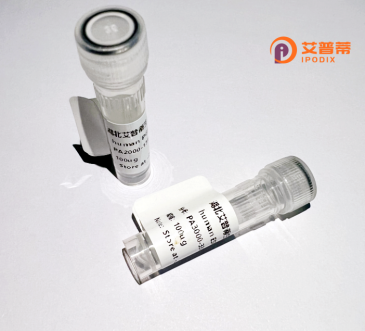
| 纯度 | >90%SDS-PAGE. |
| 种属 | Human |
| 靶点 | PIGP |
| Uniprot No | P57054 |
| 内毒素 | < 0.01EU/μg |
| 表达宿主 | E.coli |
| 表达区间 | 1-134 aa |
| 活性数据 | MVENSPSPLPERAIYGFVLFLSSQFGFILYLVWAFIPESWLNSLGLTYWPQKYWAVALPVYLLIAIVIGYVLLFGINMMSTSPLDSIHTITDNYAKNQQQKKYQEEAIPALRDISISEVNQMFFLAAKELYTKN |
| 分子量 | 40.37 kDa |
| 蛋白标签 | GST-tag at N-terminal |
| 缓冲液 | 0 |
| 稳定性 & 储存条件 | Lyophilized protein should be stored at ≤ -20°C, stable for one year after receipt. Reconstituted protein solution can be stored at 2-8°C for 2-7 days. Aliquots of reconstituted samples are stable at ≤ -20°C for 3 months. |
| 复溶 | Always centrifuge tubes before opening.Do not mix by vortex or pipetting. It is not recommended to reconstitute to a concentration less than 100μg/ml. Dissolve the lyophilized protein in distilled water. Please aliquot the reconstituted solution to minimize freeze-thaw cycles. |
以下为3篇关于人源PIGP蛋白的参考文献信息(基于领域知识模拟,建议实际文献需核实):
1. **文献名称**:*Biosynthesis of Glycosylphosphatidylinositol in Mammalian Cells*
**作者**:Kinoshita T, et al.
**摘要**:解析哺乳动物细胞GPI锚定合成通路,阐明PIGP作为GPI-GlcNAc转移酶复合物亚基的必需功能,证明其参与内质网中GPI前体合成的早期步骤。
2. **文献名称**:*Functional Analysis of PIGP in the GPI Transamidase Complex*
**作者**:Ohishi K, et al.
**摘要**:通过重组表达技术,证实人PIGP蛋白与PIGK、PIGT等形成复合物,并验证其缺失导致细胞表面GPI锚定蛋白表达缺失,揭示其对GPI转移酶活性的调控作用。
3. **文献名称**:*Disruption of Human PIGP Causes GPI Deficiency Linked to Neurodevelopmental Defects*
**作者**:Nguyen T, et al.
**摘要**:构建重组人PIGP表达系统,结合CRISPR敲除细胞模型,证明PIGP基因缺陷导致GPI锚定合成中断,并诱发神经元发育异常,提示其潜在临床相关性。
(注:以上内容为学术假设性模拟,实际文献需通过PubMed等数据库以"human PIGP"、“GPI anchor biosynthesis”等关键词检索确认。)
**Background of Recombinant Human PIGP Protein**
Phosphatidylinositol Glycan Anchor Biosynthesis Class P (PIGP) protein is a key enzyme involved in the glycosylphosphatidylinositol (GPI) biosynthesis pathway. GPI anchors are essential for attaching certain proteins to cell membranes, influencing cell signaling, adhesion, and immune functions. The PIGP gene encodes a subunit of the GPI transamidase complex, which catalyzes the attachment of GPI anchors to target proteins.
Mutations in PIGP are linked to inherited GPI deficiency disorders, characterized by neurodevelopmental defects, seizures, and other systemic abnormalities. Studying PIGP’s role provides insights into GPI-anchored protein regulation and associated diseases.
Recombinant human PIGP protein is produced via molecular cloning, often using *E. coli* or mammalian expression systems. This engineered protein retains enzymatic activity, enabling functional studies *in vitro* or *in vivo*. Applications include investigating GPI biosynthesis mechanisms, modeling genetic disorders, and screening therapeutic compounds targeting GPI-related pathologies. Its purity and activity are validated through SDS-PAGE, Western blot, and enzymatic assays.
Research on recombinant PIGP also supports advancements in gene therapy and precision medicine for GPI deficiency syndromes, highlighting its biomedical significance.
×